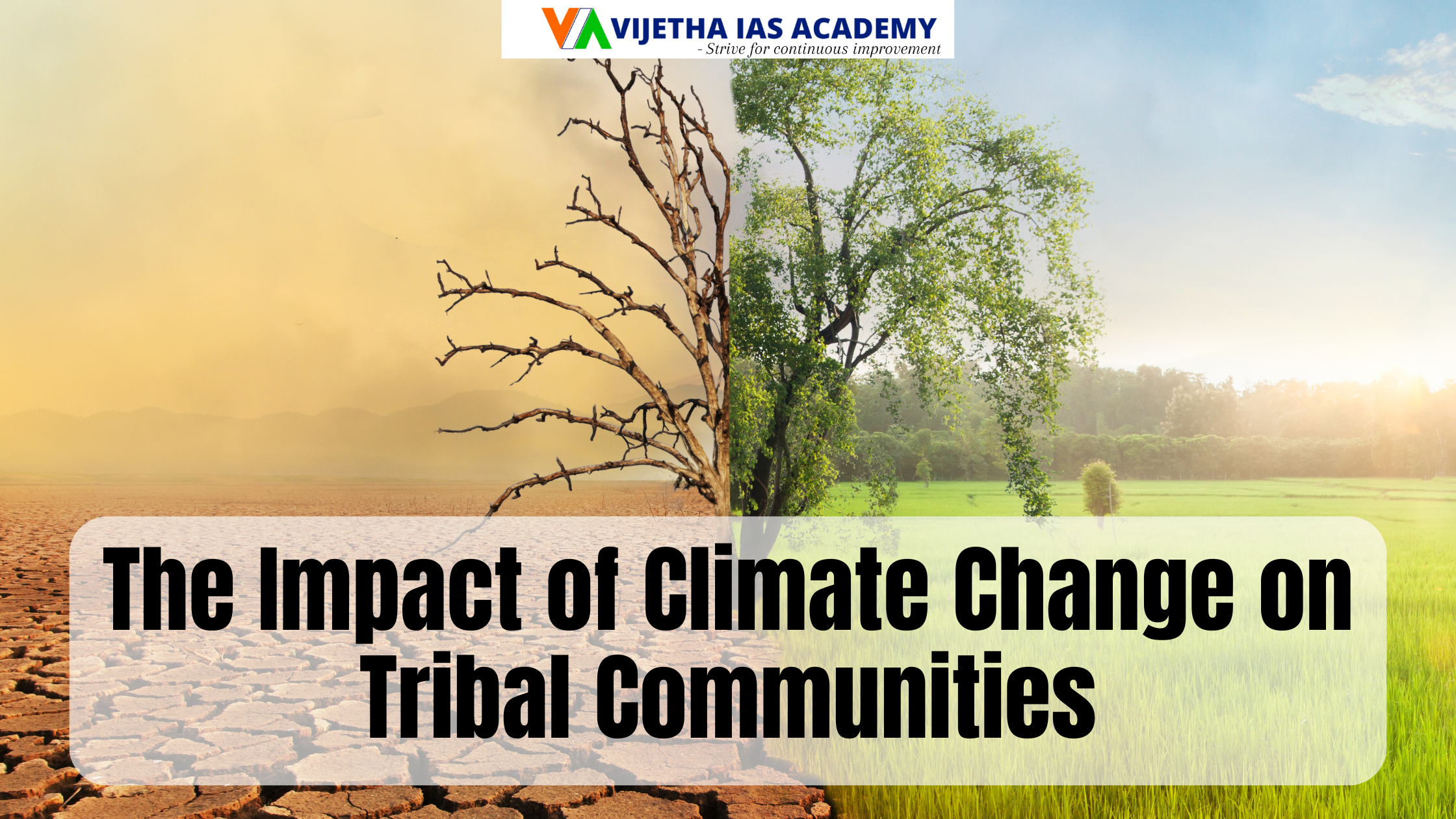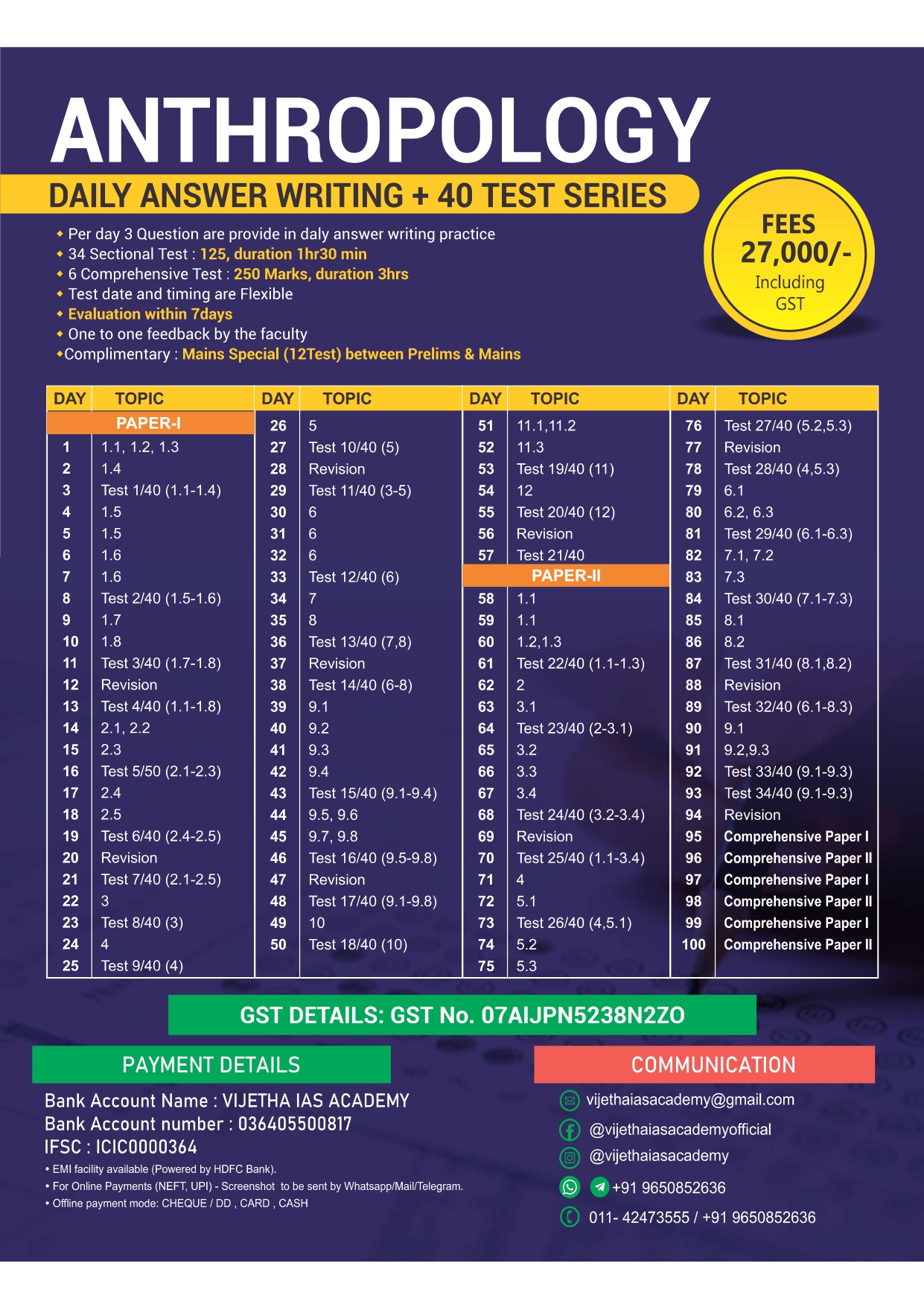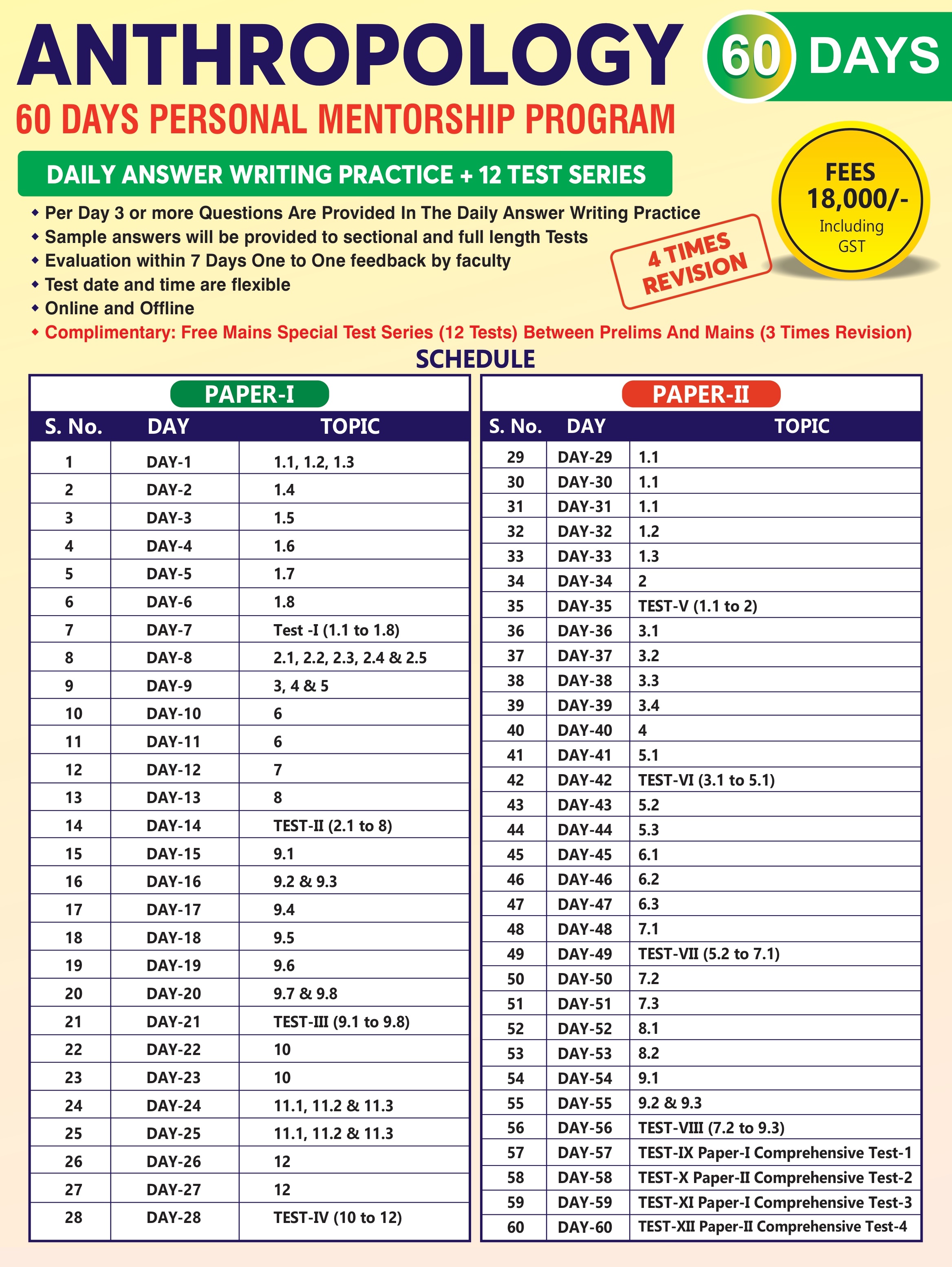
Custodians of natural resources are the tribals, but they are the most deprived. Critically examine how climate change will impact their survival in future.
(20 Marks) Anthropology Optional Paper CSE 2024
Introduction
Tribal communities in India and across the world have historically acted as custodians of natural resources, practising sustainable lifestyles that harmonize with nature. They rely heavily on forests, water bodies, and land for their sustenance and livelihood. Despite their significant role in conserving biodiversity, tribal communities often remain marginalized and deprived of basic amenities. Climate change, with its profound environmental and socio-economic impacts, threatens to exacerbate the vulnerabilities of these already marginalized communities, affecting their survival and traditional ways of life.
Main Body
Dependence on Natural Resources:
Forests and Biodiversity:
Tribal communities depend on forests for food, medicine, fuel, and shelter. Their traditional knowledge has contributed to the conservation of biodiversity. However, climate change-induced deforestation and changing ecosystems directly threaten their livelihoods.
Agriculture and Water Resources: Many tribes practice subsistence farming and depend on predictable weather patterns. Erratic rainfall, prolonged droughts, and floods, all consequences of climate change, disrupt agricultural cycles, leading to food insecurity.
Fishing Communities: Coastal and riverine tribal communities rely on fishing for sustenance. Rising sea levels, ocean acidification, and overfishing due to climate change put these communities at risk, depleting fish stocks and increasing competition for resources.
Impact of Climate Change on Tribal Survival:
Loss of Livelihoods: Climate change disrupts traditional livelihood practices such as shifting agriculture (jhum), hunting, gathering, and fishing, leading to economic deprivation. Reduced access to natural resources forces tribes to seek alternative livelihoods, often in urban centers where they face further marginalization.
Displacement and Land Alienation: Rising sea levels, desertification, and deforestation may lead to displacement of tribal communities from their ancestral lands. This displacement is often compounded by developmental projects and land acquisitions, pushing tribes into more vulnerable situations.
Health Impacts: Climate change also affects the health of tribal communities. Increased incidence of vector-borne diseases like malaria, waterborne diseases due to floods, and malnutrition caused by food insecurity disproportionately affect tribes due to their limited access to healthcare services.
Cultural Erosion: The disruption of tribal ecosystems and displacement often results in the erosion of traditional knowledge and cultural practices, as these are closely tied to their natural surroundings. This loss of cultural identity further marginalizes these communities.
Challenges in Adaptation:
Lack of Representation: Tribal communities are often excluded from policy-making processes related to climate change, leading to the neglect of their needs and perspectives in climate adaptation strategies. Their traditional knowledge of resource management remains underutilized in formal climate policy frameworks.
Economic Marginalization: Tribals are economically marginalized and have limited access to resources that can help them adapt to climate change. Insufficient infrastructure, lack of access to education, and poverty compound their vulnerability.
Development vs. Conservation: Large-scale development projects, such as mining and dam construction, often prioritize economic growth over environmental conservation and tribal rights. These projects degrade ecosystems that are vital for tribal survival, contributing to further environmental degradation.
Potential for Tribal Communities in Climate Adaptation:
Traditional Knowledge as a Resource: Tribal knowledge systems, especially concerning sustainable agriculture, biodiversity conservation, and water management, can provide valuable insights into climate adaptation strategies. Integrating this knowledge into modern climate resilience frameworks could benefit both tribes and the broader fight against climate change.
Community-Led Conservation: Empowering tribal communities through community-based natural resource management can help preserve ecosystems while improving their socio-economic conditions. Successful models, such as joint forest management (JFM), demonstrate the potential for tribals to play a pivotal role in conservation and adaptation.
Policy Interventions Needed:
Inclusion in Climate Policies: Tribal communities must be included in national and global climate change policies. Providing platforms for tribal participation in decision-making can ensure that their concerns are addressed in adaptation and mitigation efforts.
Sustainable Livelihood Programs: Governments need to implement sustainable livelihood programs that align with traditional tribal practices while offering resilience against climate change. Financial support, access to markets, and climate-resilient infrastructure are key to ensuring economic stability for these communities.
Legal Protections for Land and Resources: Strengthening legal protections for tribal land and natural resources is critical to ensuring that these communities are not displaced or deprived of their traditional livelihoods. Acts such as the Forest Rights Act, 2006 should be effectively implemented to safeguard tribal rights.
Conclusion
While tribals have long been the custodians of natural resources, their survival is increasingly threatened by climate change, which disrupts their livelihoods, health, and cultural identity. To ensure their survival in the future, it is essential to integrate tribal knowledge and practices into broader climate adaptation strategies. Moreover, stronger policies that protect their land rights, promote sustainable development, and involve tribals in decision-making processes are crucial for building resilience against the growing threats of climate change. Empowering tribal communities as key stakeholders in conservation and climate resilience will benefit not only their survival but also global efforts to combat environmental degradation.
Anthropology Test Series Programme (Online + Offline))
We provide Anthropology Daily Answer Writing a range of programs designed to cater to various stages of UPSC preparation. Whether you're just starting out, have attempted the Mains before, or are getting ready for Mains 2024, we have the right option for you. Allow us to assist you in choosing the course that best fits your needs.
|
Level of Preparation |
Test Series Program |
Test Series Content |
Test Schedule |
|
Self-study of Anthropology Optional |
Anthropology 100 Days Personal Mentorship Program |
Daily answer writing, 34 sectional tests, 6 comprehensive tests, and complementary Mains Special 12 tests (between prelims and mains) |
|
|
Revise whole syllabus through Daily Answer Writing Practice and Tests |
Anthropology DAW Mentorship Program |
Daily Answer Writing Practice and 8 sectional and 4 Full Length tests |
|
|
Revise whole syllabus through Sectional and Full Length Tests |
Anthropology Tier- I T-40 Test Series |
34 Sectionals and 6 Full Length Tests |
|
|
Written Mains earlier and need more practice |
16-Anthropology Tier II Test Series |
10 sectional and 6 Full-Length Tests. |
|
|
Cleared Prelims 2023 and are preparing for Mains 2023 |
Mains Special 12 Tests program |
8 Sectional and 4 Full-Length Tests |
ANTHROPOLOGY MAINS SPECIAL COURSES
Enroll in our Anthropology Mentorship Program today and take the first step towards achieving your UPSC goals!
1) If you are going for Self study of Anthropology Optional and looking for a Comprehensive Program that includes Daily Answer Writing, 34 Sectional tests, 6 Comprehensive tests, and Complementary mains special 12 tests (between prelims and mains), our Anthropology 100 Days Personal Mentorship Program is the perfect choice.
2) If you want to revise Whole Syllabus through Daily Answer Writing Practice and 8 sectional and 4 full length tests, then our Anthropology DAW Mentorship Program is the best fit for you.
3) If you want to revise Whole Syllabus through 34 Sectionals and 6 Full Length Tests then Anthropology Tier- I T-40 Test Series is for you.
4) If you have written Mains earlier and need more practice, then our 16-Anthropology Tier II Test Series is a great option. This test series includes 10 sectional and 6 full-length tests.
5) if you have cleared Prelims 2023 and are preparing for Mains 2023,our Mains Special 12 Tests program is a must-have. This program includes 8 sectional and 4 full-length tests to help you prepare for the big day.
For more information on Vijetha IAS Academy’s Anthropology mentorship programs Deatils : https://vijethaiasacademy.com/anthropology-test-series
Anthropology 100 Days Personal Mentorship Program ( 7 + 3 Times Revision )

Anthropology 60 Days Personal Mentorship Program ( 4 + 3 Times Revision )

For more information: https://vijethaiasacademy.com/anthropology-test-series
Details Of Anthropology Classes Program
Top Anthropology Optional IAS Coaching Center in Delhi Vijetha IAS Academy | Best Anthropology Optional IAS Coaching in Delhi
Fee Structure:
- Tier 1: Rs. 55,150/- (3 Years Validity of Offline/Live Batch)
- Tier 2: Rs. 42,000/-
- Tier 3: Rs. 36,000/-
Batch Size: 50 – 60 Students
UPSC Notes
Anthropology Optional IAS Coaching Notes, IAS Exam Preparation Booklets, IAS optional coaching Notes, UPSC Coaching Notes, Video Lectures, Live Classes with faculty, Chat Facility Available
Teachers Name: N P Kishore Sir
Past Result
- Last Years Result 2023
- 35 Total Selections in CSE 2023
Google Reviews: 4.9 out of 5 stars
Website: Vijetha Anthropology Optional IAS Coaching in Delhi (https://vijethaiasacademy.com)
Faculties of Vijetha IAS Academy
- N P Kishore Sir
Features
- Vijetha IAS Academy offers Online and offline Courses for better preparation of Anthropology Optional Strategy for UPSC in Delhi.
- For better Anthropology optional Exam Preparation, Vijetha IAS Academy Delhi Conducts the Motivational IAS Session.
- Vijetha IAS Academy provides you with the CASE STUDIES on the pattern of the real-time IAS Exam which is helpful for better preparation of the Best Coaching for UPSC Anthropology Optional Optional IAS Examination.
- DAW & WAW – Revision Through Daily & Weekly Answer Writing Practice is offered by Vijetha IAS Academy for better result of the Anthropology Optional IAS examination.
Advantages of joining Vijetha IAS Academy
- Best Faculties for Anthropology Optional IAS Coaching in Delhi
- Best facilities, infrastructure and updated Case Studies Booklets and Notes for better preparation of the Anthropology Optional IAS Examination in Delhi.
- Best result in Past years for Anthropology Optional Strategy for UPSC Examination in Delhi
- Best Rated coaching institute for Anthropology Optional IAS Examination in Delhi.
- Vijetha IAS Academy also provides recorded lectures videos, notes which is very helpful for better preparation of Anthropology Optional IAS Coaching in Delhi
Fees Structure of Vijetha IAS Academy
|
Tier 2 |
Tier 1 |
Tier 3 |
BATCH STARTS FROM |
|
42,000/- |
55,150/- (3 Years Validity Offline/Live Batch) |
36,000/- |
REGISTRATION – START |
Fees Structure of Vijetha IAS Academy
|
Course Name |
Fees Amount |
Course Duration |
|
GS Offline (Pre + Mains+ CSAT) with Essay+Answer Writing |
Rs.99,000 (Including GST) |
400+ Days |
|
GS Online |
Rs.18,999 (Including GST) |
400+ Days |
|
GS Mentorship Programme |
Rs.29,999 (Including GST) |
1 Year |
For more information on our courses, visit our Anthropology Courses page. Explore our Test Series and Online Courses for flexible learning options.
Vijetha IAS Academy
Add. 2nd Floor, 50, Shankar Road, Block 7, Old Rajinder Nagar, Rajinder Nagar, New Delhi, Delhi 110060
MOB. 096508 52636
Open 7 Am : Closes 9 PM
Keywords:
climate change, tribal communities, natural resources, anthropology 2024 question paper, Anthropology optional subject question paper 2024, Anthropology optional 2024 question paper, Anthropology Optional Coaching UPSC, Vijetha IAS Academy Anthropology, Anthropology crash course UPSC, Anthropology daily answer writing UPSC, Kishore sir Anthropology
